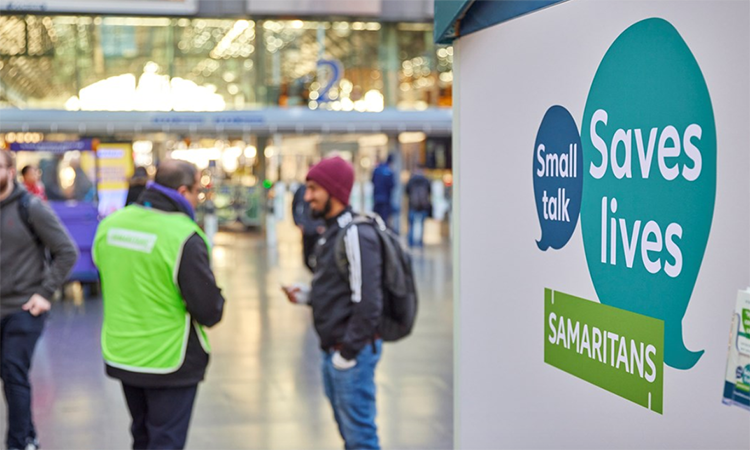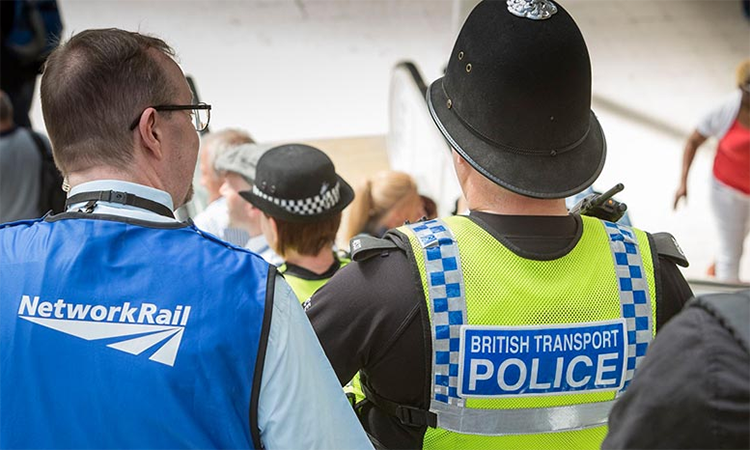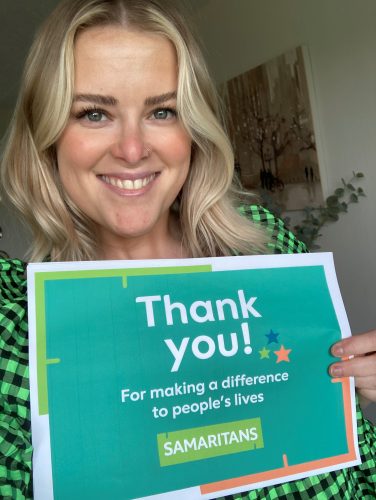Saving lives: Samaritans and Network Rail’s Suicide Prevention Partnership
Posted: 10 September 2024 | Louise McNally - Network Rail, Olivia Cayley - Samaritans | No comments yet
To mark World Suicide Prevention Day 2024, Olivia Cayley, Head of Rail Programme at Samaritans, and Louise McNally, Suicide Prevention Lead at Network Rail, spoke to Global Railway Review’s Halimah Haque about their joint efforts in suicide prevention across the rail network and the impact of their 15-year partnership.


Credit: Samaritans
To begin, Olivia, could you give us an outline about who Samaritans is and how the partnership with Network Rail came to be?
We champion this partnership because of the difference it makes to our vision that fewer people die by suicide”
Olivia Cayley: My name is Olivia Cayley and I’m Head of Rail Programme at Samaritans. I’ve been working in this role for three and a half years.
The Suicide Prevention Programme that’s delivered in partnership with Network Rail, the British Transport Police and the wider rail sector, has been delivered for around 14 years now. We’re approaching the 15th year of the partnership in the programme and as a charity it’s something that we’re really proud of. We champion this partnership because of the difference it makes to our vision that fewer people die by suicide.
The programme has evolved over those 14 years, but at its heart has stayed constant: How do we ensure that the industry leads the way in reducing the lives lost to suicide on the railway, as well as support those affected by them, be that staff or commuters and passengers?
We deliver the programme in a series of interconnected activities, so a range of activities and mitigations mainly looking at things like behaviour change campaigns, training rail staff, working on a local level to look at data informed evidence around how we can reduce risk. We do this through numerous partnerships working on the ground, but also supported by Samaritan’s 23,000 volunteers who are out there providing emotional support and engaging with communities to raise awareness of the help that they can seek.
Louise, as the Suicide Prevention Lead at Network Rail, can you further explain what the Rail Suicide Prevention Programme is and how it works to support both passengers and rail staff in times of crisis?
Small talk can make such a big difference in preventing something really big from happening. It’s about breaking somebody’s thought process in that crucial moment”
Louise McNally: The Rail Suicide Prevention Programme helps us, as an entire industry, respond as effectively as we can to the many people that are presenting on the railway either in distress, in crisis, or struggling to cope. It also provides invaluable support to those members of the workforce who find themselves involved in some difficult incidents.
There’s a real regional focus now, Samaritans works in partnership with Network Rail, but it’s an industry-wide partnership. So, the organisation works in partnership at local level with Network Rail, train operators, the British Transport Police, but also beyond the rail industry in public health agencies and local charities. Anybody really that can help with a co-ordinated local response to vulnerability and suicide prevention.
One of the key things that we do is encouraging those who might be vulnerable to talk about how they’re feeling, talk about their mental health, including any suicidal thoughts, even if it does feel a bit scary. And obviously, World Suicide Prevention Day is a really good time to highlight that really important message.
Small talk can make such a big difference in preventing something really big from happening. It’s about breaking somebody’s thought process in that crucial moment and encouraging bystanders to recognise if somebody might be vulnerable.


Credit: Network Rail
Olivia, as you’ve mentioned, the partnership’s been going on for nearly 15 years. What have been some of the key milestones and successes in this collaboration, especially regarding the interventions that have taken place across the rail network?
We’ve now trained over 35,000 rail staff on our suicide prevention course, and also our trauma awareness course”
Cayley: You touched there on interventions, which is a word in this context, that means when a member of our staff, the public or a police officer has intervened with someone and approached them when they think that they may be vulnerable or in a suicidal crisis. They use dialogue skills that are based on the training we provide to our Samaritans volunteers to support that person and move them to a place of safety and hopefully refer them on to further support. Those interventions are the perfect example of when a small act can go on to actually save someone’s life.
We know that the training we provide equips rail staff with the ability to do this. One of the key milestones that we achieved this year is that we’ve now trained over 35,000 rail staff on our suicide prevention course, and also our trauma awareness course.
We’re really proud of having delivered several iterations of different award-winning campaigns supported by the wider rail industry, but also our Samaritan’s volunteers. Touching on something that Louise mentioned earlier – a campaign that we’ve been delivering for seven years is called Small Talk Saves Lives. Small talk is something we’re known for in British society and this campaign encourages the general public to trust their instincts and strike up a conversation with someone if they think they’re struggling, wherever they may encounter them.
The other thing that we’re really proud of is the culture change piece inside the rail industry. Over these 15 years, we’ve seen that the industry is now leading the way in reducing stigma, talking about mental health and suicide, and we’ve worked with key players to ensure that their policies and processes really reflect that encouragement and champion taking care of ourselves, seeking support and reducing the stigma around those topics.
With over 1,937 life-saving interventions from April 2023 to March 2024, how do both organisations measure the impact of the programme on suicide prevention and what more can be done to further reduce these numbers?
McNally: As Olivia mentioned, 35,000 employees have been trained, but that’s the tip of the iceberg. Each one of those people that go into training, that then go on to make an intervention, has a knock-on impact on somebody’s life. So, that 35,000 has an ongoing ripple effect. Usually, between 1,700 and 2,200 interventions take place every year. The training plays a huge part in giving people the confidence to make those interventions.
One human interaction can irrevocably change someone’s life in that moment. And without the programme and that culture of change, we wouldn’t be able to show those stories”
Cayley: The intervention of staff that you mentioned is just one way that we measure that story of change. Yes, it shows us the reported and recorded incidents that are happening, but it is just a snapshot. So, we have a comprehensive monitoring evaluation framework for the programme. This looks at how we measure all different things, so that might be around the number of staff trained. It might be about the research that we’ve carried out with academic institutes to better understand what is happening, or it might also be the local level partnerships and events that we are running to encourage people and raise awareness of our services.
The other thing that’s central to this is real stories. The stories of human kindness, compassion and empathy that happen every day across the rail infrastructure. They show us that one human interaction can irrevocably change someone’s life in that moment. And without the programme and that culture of change, we wouldn’t be able to show those stories.
We’ve had real life stories, for example, of rail staff who have intervened. People like Rizwan Javed, who has saved over 30 lives through the training that we’ve provided. But Rizwan is just one example of hundreds of rail staff who do that work every day.
We all have the innate ability to connect with people and to be vigilant about what we’re seeing. World Suicide Prevention Day on 10th September is a fantastic way that our charity, Samaritans, are encouraging people to do more of that.
We’ve used World Suicide Prevention Day to give people new tips on what they should do. They include watching out for changes in behaviour that could mean someone struggling to cope, speaking up and letting someone know that that support is available to them, and also ditching the stigma. Suicidal thoughts are far more common than people realise, so let’s talk about it and let’s remove some of that shame and fear.
On the note of the staff training, how can rail staff access this free training and what are some of the key skills they gain to help in these real-life situations?


Credit: Samaritans
McNally: The training gives people the skills, tools and importantly the confidence to make an intervention. It helps anybody that has that thought process of, ‘Am I doing the right thing? What do I say? What do I do?’ So many people do this training and then go on to make a subsequent intervention confidently. And it’s so important for the person to feel confident that they dealt with the situation they were in, in the best way that they possibly could.
Everyone who works on the railway has access to the Managing Suicidal Contacts course, and the course availability list can be obtained by emailing [email protected].
The training is delivered in a number of ways. Naturally, we prioritise people that are most likely to come into contact with these sorts of incidents. So, if staff are front facing, interacting with passengers, then they’re more likely to get onto a course quickly. But we also accept office-based staff too, and we have online training available as well.
For companies and individuals who want to get involved in suicide prevention efforts, what opportunities are currently available for them to contribute to the Rail Suicide Prevention Programme?
Small acts, like checking in with others and asking, ‘How is life going?’ to see what’s really happening with them, can make a big difference”
Cayley: There’s a range of different ways that members of the public can get involved with what we do. Rail staff and the general public can get involved in the campaigns that we deliver, as well as by spreading that message of small talk and also our Brew Monday campaign that we deliver every January.
If you’re interested in how you can give your time or your voice to Samaritans, you can find out more on our website. We do a lot of advocacy campaigning as well at local and national government level, and we would call on people to get involved in those requests that we make to government around investing in suicide prevention.
People can also get involved at an individual level. Small acts, like checking in with others and asking, ‘How is life going?’ to see what’s really happening with them, can make a big difference. By having these open conversations, we give people the chance to express how they feel and get the support that they need.
We all have a part to play, as suicide prevention is everyone’s business.
Looking ahead, as the programme approaches its 15th year milestone in 2025, what are some of the future plans or innovations that Network Rail and Samaritans are working on to enhance suicide prevention efforts on the rail network?
McNally: We have just put in place our agreements with charities going forward. So, training is one element, campaigns another and they are elements that have been in place for a number of years now. We’ve been able to look at them, see how they’re working, and we know that they’re doing their thing.
We’re currently looking at new, innovative ways that we can support members of the public and rail staff following a traumatic incident”
From a more proactive perspective, we have Samaritans Regional Development Lead that sit in each of our Network Rail regions and work alongside BTP and train operators to understand what’s going on at local level. So, where we can see suicide risk or the risk of vulnerable presentations going up at a particular location, we can put together a plan for that location, decide who it is that we need to work with within the community to understand that risk and how to respond to it collectively. As a rail industry, this is not a problem that we can deal with on our own. We have to work with wider communities to work towards solving that challenge collectively.
Cayley: We are going to continue to deliver our help, our behaviour change campaign, Small Talk Saves Lives – which we’ll be launching on 4 March 2025 and we’re really excited to take that campaign to the next level. We are going to continue to work with rail staff and innovate in how we reach more rail staff and deliver that training.
We’re currently looking at new, innovative ways that we can support members of the public and rail staff following a traumatic incident. We’re also deepening and furthering our work at a local community level, working with more partners to make sure that people who are struggling to cope and particularly are facing specific issues in their lives, have the right support at a local level.
One of the things we know is that research and evidence really helps inform our programme and our strategy. As a result, that there are plans to continue working with academic institutes to deepen our understanding of this issue.
Finally, as it’s World Suicide Prevention Day, what message would you like to share with the public, particularly those who may be struggling about the importance of mental health support in and around the rail network?
If we’re able to become more comfortable talking about the broader subject of mental health over the years, then we have the ability to do the same with suicide”
McNally: If you are struggling to cope, do not to be afraid of having a conversation with somebody you care about, a friend, family, or a professional – you can call Samaritans. But make sure that you are talking about it.
Cayley: A recent poll found that only 45% of people feel comfortable talking to their friends and family about suicide or suicidal thoughts, compared to 74% of people who said that they feel comfortable talking about mental health. It’s this gap that we, as a charity, really want to start to close. If we’re able to become more comfortable talking about the broader subject of mental health over the years, then we have the ability to do the same with suicide. So, we would encourage people to let go of some of that fear. Lean in and mention that word to your family and friends and see what it brings up for people. The more we talk about it, the more comfortable we become and the more we hope that people will be able to seek the support that they need.




.
OUT NOW: The Definitive Guide to Rail’s Digital Future
The rail industry is undergoing a digital revolution, and you need to be ready. We have released our latest market report, “Track Insight: Digitalisation.”
This is not just another report; it’s your comprehensive guide to understanding and leveraging the profound technological shifts reshaping our industry. We move beyond the buzzwords to show you the tangible realities of AI, IoT, and advanced data analytics in rail.
Discover how to:
- Optimise operations and maintenance with real-time insights.
- Enhance passenger services through seamless, high-speed connectivity.
- Leverage technologies like LEO satellites to improve safety and efficiency.
Featuring expert analysis from leaders at Nomad Digital, Lucchini RS, Bentley Systems and more, this is a must-read for any rail professional.
Related topics
Passenger Experience/Satisfaction, Safety, The Workforce, Training & Development







